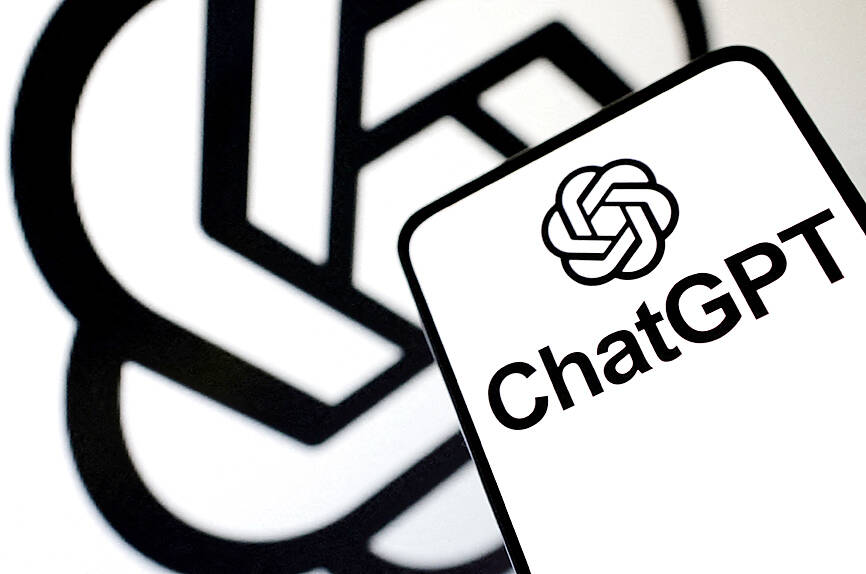Germany is joining other European nations in scrutinizing the use of personal data by the popular artificial intelligence (AI) chatbot ChatGPT and demanding answers from its US maker OpenAI, a regulator said on Monday.
Regional data protection authorities in Europe’s top economy have compiled a questionnaire for OpenAI and expect a response by June 11, said Marit Hansen, commissioner for the northern state of Schleswig-Holstein.
“We want to know if a data protection impact assessment has been carried out and if the data protection risks are under control,” Hansen said. “We are asking OpenAI for information on issues that stem from the European General Data Protection Regulation.”

Photo: Reuters
German authorities want to verify whether OpenAI under EU law sufficiently informs people whose data are used by ChatGPT that they “have rights, for example to access, correct or even delete their data,” she said.
It is also necessary to “clarify how these rights can be exercised,” she said, adding that regulators were particularly concerned about the processing of data relating to minors.
“As soon as personal data of European citizens is processed, European data protection law must be respected,” she said.
Italy last month temporarily banned the program over allegations its data-gathering broke privacy laws. It has since asked OpenAI to adjust its chatbot so it could be back online in the country at the end of this month.
France’s regulator earlier this month said that it had opened a formal procedure after receiving five complaints, while Spain’s AEPD data protection agency said it had opened an inquiry into the software and its US owner.
The EU’s central data regulator has formed a task force to help countries harmonize their policies and address privacy concerns.
Meanwhile, Cisco Systems Inc warned that AI software such as ChatGPT would make phishing attempts much harder to detect, requiring companies to adopt new defenses.
About 80 percent of illicit access into computer systems already comes via phishing, where hackers send e-mail or texts to people hoping to trick them into opening a malicious link.
AI tools can quickly customize those missives, luring more people into hackers’ schemes, said Jeetu Patel, the head of Cisco’s security and collaboration units.
“Attacks are going to get much more bespoke,” he said on Monday during a briefing in San Francisco, which is hosting the RSA Conference this week.
Until now, phishing e-mails have been relatively easy to spot because they are not tailored to individual recipients. They often have spelling mistakes and other giveaways. With the new generation of attacks, it would be harder to count on human users to spot the ruse, increasing the threat of network shutdowns and extortion attempts.
The solution is to rapidly sift through Internet traffic data and identify patterns that indicate something bad is about to happen or has just happened, Patel said.
Cisco sees this as an opportunity. The company, which leads the market for networking equipment, can use its position to analyze data flows, he said.
Additional reporting by Bloomberg

In Italy’s storied gold-making hubs, jewelers are reworking their designs to trim gold content as they race to blunt the effect of record prices and appeal to shoppers watching their budgets. Gold prices hit a record high on Thursday, surging near US$5,600 an ounce, more than double a year ago as geopolitical concerns and jitters over trade pushed investors toward the safe-haven asset. The rally is putting undue pressure on small artisans as they face mounting demands from customers, including international brands, to produce cheaper items, from signature pieces to wedding rings, according to interviews with four independent jewelers in Italy’s main

Macronix International Co (旺宏), the world’s biggest NOR flash memory supplier, yesterday said it would spend NT$22 billion (US$699.1 million) on capacity expansion this year to increase its production of mid-to-low-density memory chips as the world’s major memorychip suppliers are phasing out the market. The company said its planned capital expenditures are about 11 times higher than the NT$1.8 billion it spent on new facilities and equipment last year. A majority of this year’s outlay would be allocated to step up capacity of multi-level cell (MLC) NAND flash memory chips, which are used in embedded multimedia cards (eMMC), a managed

Japanese Prime Minister Sanae Takaichi has talked up the benefits of a weaker yen in a campaign speech, adopting a tone at odds with her finance ministry, which has refused to rule out any options to counter excessive foreign exchange volatility. Takaichi later softened her stance, saying she did not have a preference for the yen’s direction. “People say the weak yen is bad right now, but for export industries, it’s a major opportunity,” Takaichi said on Saturday at a rally for Liberal Democratic Party candidate Daishiro Yamagiwa in Kanagawa Prefecture ahead of a snap election on Sunday. “Whether it’s selling food or

In the wake of strong global demand for AI applications, Taiwan’s export-oriented economy accelerated with the composite index of economic indicators flashing the first “red” light in December for one year, indicating the economy is in booming mode, the National Development Council (NDC) said yesterday. Moreover, the index of leading indicators, which gauges the potential state of the economy over the next six months, also moved higher in December amid growing optimism over the outlook, the NDC said. In December, the index of economic indicators rose one point from a month earlier to 38, at the lower end of the “red” light.